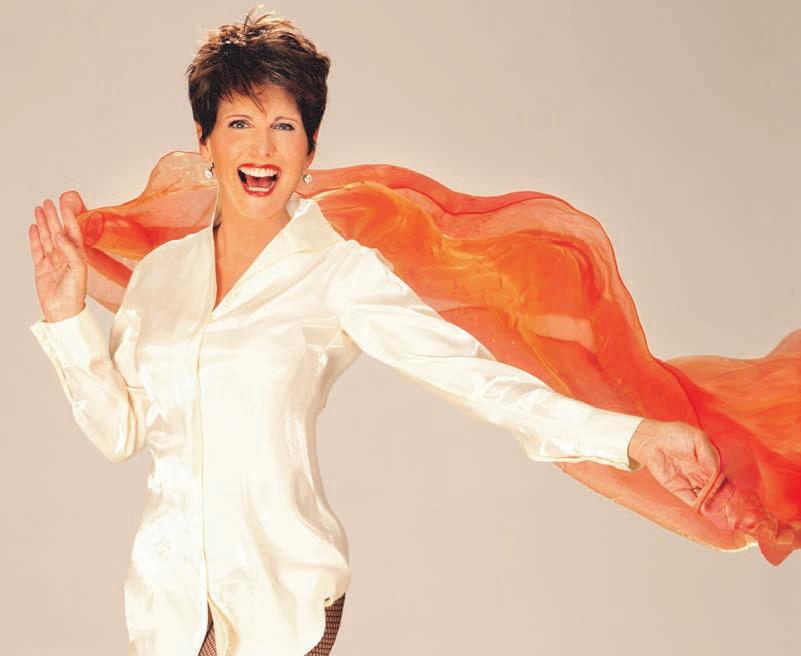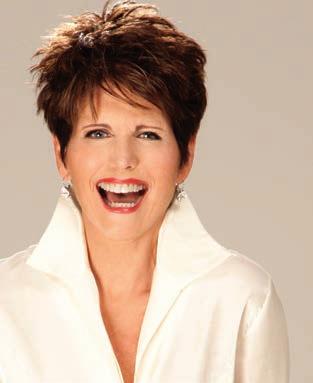
10 minute read
Feinstein’s at Hotel Carmichael Presents: Lucie Arnaz

presents Lucie Arnaz ‘I Got the Job!’: Songs From My Musical Past With Award-Winning Composer and Musical Director Ron Abel
Advertisement
Writer // Janelle Morrison • Photography // Michael Childers
For nearly three decades, Lucie Arnaz has toured her critically acclaimed nightclub acts throughout the United States and Europe, making stops in Las Vegas, Atlantic City, Reno, Miami, Feinstein’s at the Regency and at 54 Below, Birdland Jazz and the Café Carlyle in New York, and now Feinstein’s at Hotel Carmichael in Carmel, Indiana.
Lucie began her career on television at 12 years of age, in a recurring role on “The Lucy Show,” starring her mother, Lucille Ball. On film, Lucie co-starred in “The Jazz Singer” with Neil Diamond and Sir Laurence Olivier, in several made-for-television movies, including “Who Killed the Black Dahlia,” “Washington Mistress,” “The Mating Season,” “Who Gets the Friends?” with Jill Clayburgh, and “Down to You” with Freddie Prinze Jr. and Henry Winkler.
Lucie Arnaz and her husband of 40 years, Laurence Luckinbill, formed Arluck Entertainment, and their personal and professional collaboration has produced all of her concert work and his four one-man shows. Both have been the recipient of an Emmy Award for their television documentary “Lucy & Desi: A Home Movie.”
Lucie is the proud mother of three and the elated grandmother of three with Luckinbill and stepmother to his two sons. It is these credits of which Lucie is most proud.
Along with Ron Abel, the multiaward-winning composer, producer, arranger, orchestrator, conductor and musical director, this show is one you won’t want to miss!
Thursday, April 7, and Friday, April 8, 2022
Doors 6 p.m. // Showtime 7:30 p.m.
A $25 food and beverage minimum will be required for all patrons. For tickets, visit feinsteinshc.com.
JANELLE MORRISON: We are honored to have you grace the stage at Feinstein’s at Hotel Carmichael!
LUCIE ARNAZ: Thank you! I got a chance to play at the very first Feinstein’s at the [Loews] Regency years ago. They’re just the classiest clubs. There aren’t many really proper supper clubs around the country anymore. They’re disappearing, and as fast as they’re disappearing, Michael [Feinstein] seems to be finding new places to create them. I just love playing them, and now I have a little mini tour [of Feinstein’s] to go to. It makes me feel great to be invited to all of them because you never get to play anywhere nicer. I’ve actually played at the bigger stage at the Palladium there in Carmel where Michael keeps all the wonderful archives. And that was wonderful. I did my Latin Roots [concert] there several years ago.
JM: How great does it feel to be back out there touring and performing for live audiences?
ARNAZ: After the shutdown, all of the rescheduling and then the re-cancellations and rescheduling of those re-cancellations, it’s going to feel good to get back there, doing what I do creatively, I’m sure. It’s been a very strange feeling for the last two years. I haven’t had that empty of a calendar since I was 15 … and I’m not 15 now. [Laughing]
There had always been an acting job, a singing job or something that I’ve been involved with. It wasn’t until 8 or 9 months into [the pandemic] that my body went into like a withdrawal from not focusing on what I do creatively.
JM: The world has been pretty miserable throughout this pandemic, and it’s been incredibly miserable for creatives not being able to create like we have prepandemic. It has also taken a huge toll on humanity, I think, not being in community with one another. I would love your observation on this.
ARNAZ: I think you’re absolutely right. If you look back at the last time there was a pandemic, I don’t know what kind of entertainment they were losing out on at that time, but there wasn’t half of what we have now. Thank God for the internet. If you couldn’t even connect to the internet, you were really quarantined and alone. I don’t think we’ve had
a chance to experience that lack of creative input from the people who make arts and for the people who go out and absorb the arts. We’ve realized that things start to deteriorate, and we need that camaraderie, and we need to gather. Whether it’s dance or song or gallery openings, it really shows what happens to your psyche if you don’t have access to those things.
I’ve often asked while raising money for different arts organizations, schools, funding for theater or whatever, “Imagine if all of a sudden, all art was not available to you? People stopped making it. No more music, none. No theater, no movies, no TV. What if there was nothing pretty to look at or hang on your walls because no painters ever painted? What if no one could afford to be an artist anymore? Imagine your life without art. This [pandemic] was the only time we’ve had a tiny little taste of that, and it’s not a world I want to live in, you know? We always have to support artistic venues and artistic people because it could evaporate and go away if people can’t afford to do it anymore or if they don’t learn how as children in schools, colleges, conservatories and places like that. It would be a very sad universe.
We need to just go and forget our little household things and let somebody else infuse us with possibilities. I think great art should always leave you with better possibilities. Whether it’s an art gallery, nightclub or a theater—you should walk out of that space feeling like the things you want are more possible, not less possible. And even if it’s a dark experience or a dark play, if you’re moved by it or you’re challenged by it—things can get better. And if you make people think, they can be pretty terrific if they put their minds to it.

JM: What was the thought process behind putting together your new show with your musical director Ron Abel and what memories and/or experiences did it conjure?
ARNAZ: I’ve been doing this for like 30 years now, believe it or not, since I started doing my concerts. In the beginning, it started with someone calling me and asking if I wanted to do an evening of Irving Berlin for his 100th birthday. So, I put a 90-minute show together, and that’s how it all started. When it wasn’t [Irving’s] birthday anymore, I took out some Berlin and added in some Gershwin or Cy Coleman, and so I was putting together a good, entertaining show. I want to tell the best stories through song. It’s helpful when they have nice melodies, but I pick good stories and ones that I can relate to, say something before I sing them that makes people understand why I’m singing them.
This time, this show, I thought, wouldn’t it be kind of cool to take a look at all the years that I’ve been doing theater because that’s where I started—performing in plays and musicals on and off of Broadway. I have a lot of plays and musicals under my belt all the way back, literally, to high school. The first two shows I did were in high school, and then what came after was summer stock and first national tours.
When I was in my early 20s and was doing my first summer stock shows, my dad [Desi Arnaz] said to me [impersonating her father’s accent], “You know, honey, you should put together a show, a nightclub show. You could do all these wonderful songs that you do in the musicals in the nightclub and tell stories and stuff about them.” I gave him one of those “Oh God, Dad” looks because, you know, he’s your father and everything he says is going to be corny and “old-fashioned.” But when I was talking with Ron [Abel], I said, “You know, [Dad’s] idea was really a pretty good idea. Back then it would’ve been stupid because I’d only done like three shows. So, thanks to my father, we had the idea to put together a mini retrospective of my life and my journey through the musicals that I’ve done. It’s the most authentic show that I’ve ever done because it really is my whole life this time, and I’m not just picking great songs from the Great American Songbook and trying to find some connection to my own life somehow. This is truly my life, and it’s very exciting to do.
JM: I can only imagine the memories and emotions that came with putting this together. When you look back, can you describe in your words some of those emotions that you feel?
ARNAZ: It’s pretty amazing, considering it was my father’s original idea that I pooh-poohed. It’s funny how he had a premonition that this [show] was going to be a good idea. I’ve been incredibly fortunate in my career and have been so lucky. The people that I’ve worked with—really famous directors like Michael Bennett and famous composers like Cy Coleman, Marvin Hamlisch and Irving Berlin when they were still with us. Theater stories are amazing. It’s horrifying when things go wrong on stage and hilariously funny later on when you talk about it. Just the memories of how we created something and what it’s like to share with the audience and what it’s like to be in the middle of making a brand-new musical and all the things that go on. A lot of people have no clue what it takes to put on a show and how sad it is when you work that hard for that long and it opens and then it closes. They give it 180% to make it good. They don’t go out there and do this so [the show] fails. They’re thinking they’re working on a hit, and then sometimes it just hinges on one reviewer that didn’t like it and the show is dead. It’s horrible, and it’s a very hard business. Irving [Berlin] was right—it really is a crazy business but a wonderful business. I love it from the moment I get up in the morning until I come home at night and take my makeup off. I love what I do. I like the tightrope walk. The curtain goes up—live audience—and it’s you. Nobody there to save your ass, which is why I’ve stayed primarily in theater and in nightclubs. Theater is of the moment, and then it’s gone. If you weren’t there that night, you didn’t see the performance. I love that because it’s all about what you do, and you either do it right or you don’t, and I like the challenge.
JM: Why do you feel it’s important to preserve our musical past and national treasures such as the Great American Songbook?
ARNAZ: It’s important to have parents that appreciate the Great American Songbook. I was lucky. My dad, that’s what he did. He was a bandleader and a singer. He had these great charts. That’s the reason why I do what I do right now in concerts. It’s because of his music. When he passed away, I found some tapes of his original live performances in these great clubs around the country and live radio show performances. Of course, I knew his music and that he sang with a band because it was on “I Love Lucy,” but to hear the actual beginnings in the ’30s and ’40s, when he was first doing this, I was so inspired. His choice of music was impeccable. There were Broadway tunes and Great American Songbook tunes and a few Spanish things thrown in, but always really good music. I had that music around me, and even when my parents divorced, my mother [Lucille Ball] married Gary Morton, who was a stand-up comic who opened for all the great singers at that time: Sinatra, [Mel] Tormé, Sammy Davis Jr., Lena Horne and all the greats. So, he had a tremendous library of albums and music for us to listen to at home. It was constantly in the background, so I grew up understanding that music and the stories that those people told.
JM: These songs and collections are such an important part of our past and are equally important to our future. Are you concerned that “great” music will be lost in future generations?
ARNAZ: I like a lot of what I’m hearing with the younger generations. In the last 40 years, music has changed, and I appreciate it on various levels as it comes and goes. My mom thought The Beatles were ridiculous, so every generation has to question the coming generation, I guess.




